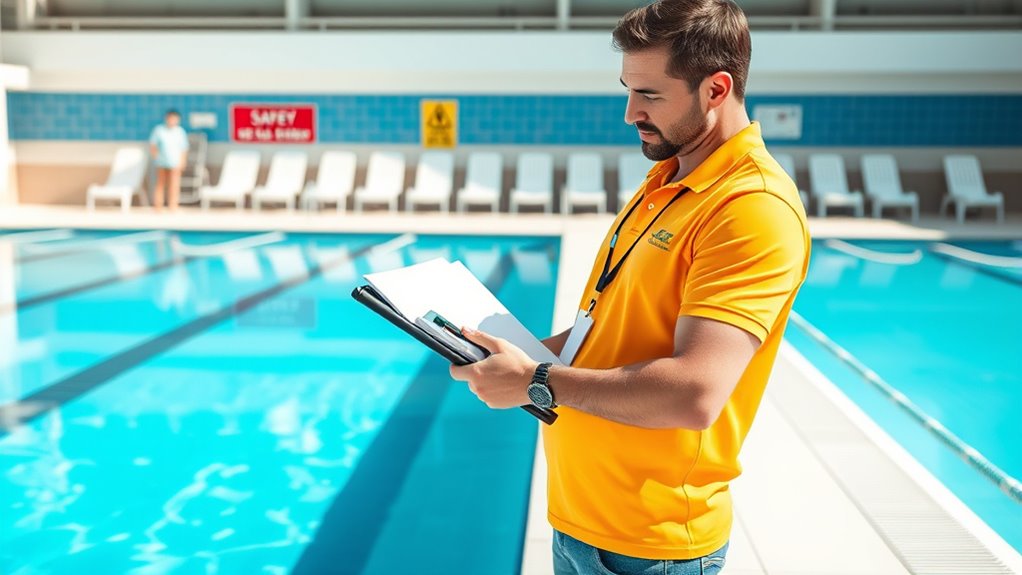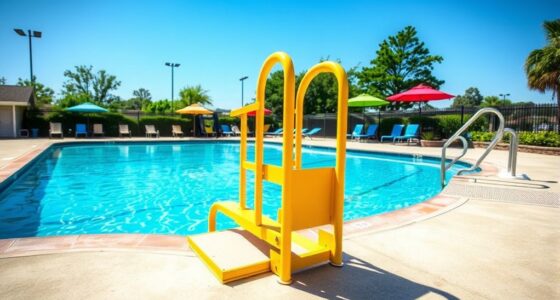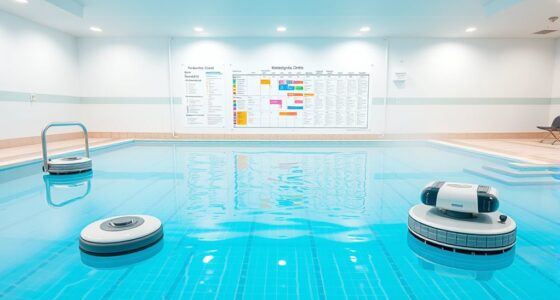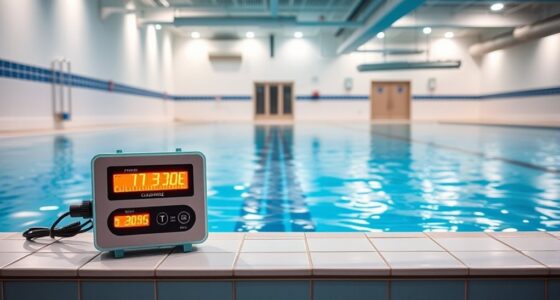To pass commercial pool health inspections, you need to make certain water quality, proper chemical levels, and overall cleanliness. Regularly test chlorine, pH, and other chemicals, and keep detailed records of your inspections and adjustments. Train your staff on chemical handling, safety protocols, and emergency procedures. Maintain your filtration systems and keep everything organized for inspectors. Staying compliant isn’t just about passing today’s inspection — it’s about providing a safe, enjoyable environment every day. Keep learning to stay ahead.
Key Takeaways
- Regularly test and adjust water chemistry, including chlorine and pH levels, to ensure safety and compliance.
- Maintain detailed records of water tests, chemical adjustments, and maintenance activities for inspection readiness.
- Train staff thoroughly on chemical handling, emergency procedures, and safety protocols to prevent hazards.
- Keep pool equipment, filtration systems, and sanitation practices well-maintained and organized.
- Conduct routine internal inspections and adhere strictly to safety regulations to demonstrate compliance to inspectors.
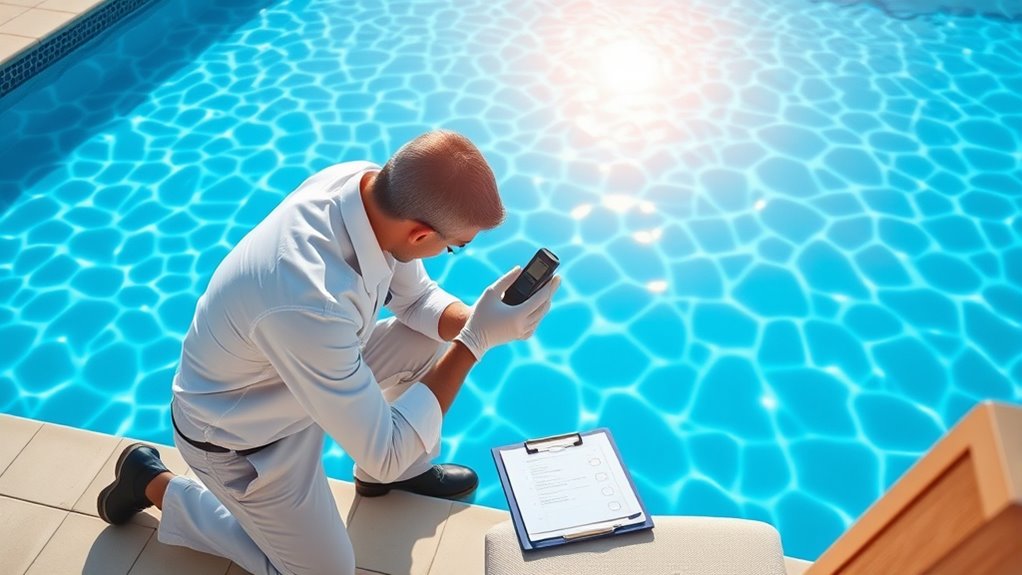
Maintaining a safe and clean swimming pool requires regular health inspections to guarantee all standards are met. When it comes to commercial pools, these inspections aren’t just about compliance—they’re about protecting your guests and your reputation. One of the key aspects inspectors focus on is chemical safety. Proper chemical management is essential to ensure the water remains safe, clear, and free of harmful bacteria or algae. You need to regularly test and adjust chlorine, pH levels, and other chemical balances to prevent issues like eye irritation or skin problems. Failing to maintain correct chemical levels can lead to unsafe conditions, potentially resulting in fines or closure. That’s why having a clear, consistent chemical safety protocol is important. You should keep detailed records of chemical testing and adjustments, making it easier to demonstrate compliance during inspections. Additionally, implementing vertical storage solutions can help organize chemical supplies and testing equipment, ensuring quick access and reducing clutter that could hinder safety procedures.
Equally important is staff training. Your team must be well-versed in proper chemical handling, water testing procedures, and emergency response protocols. Proper staff training ensures that everyone understands the importance of chemical safety and can identify potential problems before they escalate. It also minimizes the risk of accidents, such as chemical spills or improper dosing, which could compromise pool safety. Inspections often check whether staff are knowledgeable and following established safety procedures. Investing in ongoing training sessions not only helps you stay compliant but also boosts your team’s confidence and competence. Well-trained staff can quickly address issues like fluctuating chemical levels or equipment malfunctions, maintaining a safe environment for all.
In addition to chemical safety and staff training, inspections will scrutinize your pool’s filtration systems, sanitation practices, and overall cleanliness. Regular maintenance reduces the likelihood of unsanitary conditions that could lead to health hazards. Keep your records organized, including maintenance logs, chemical test results, and training certifications, so you can readily provide proof of compliance. Failure to meet standards in these areas might lead to fines, forced closures, or damage to your reputation. To stay ahead, implement routine internal audits and encourage your team to adhere to safety protocols diligently. When inspections happen, your preparedness and adherence to safety standards will reflect positively, making the process smoother and less stressful. Ultimately, prioritizing chemical safety and staff training is fundamental to running a successful, compliant commercial pool that’s safe and enjoyable for everyone.
Frequently Asked Questions
How Often Should Commercial Pools Be Inspected?
You should inspect your commercial pool at least daily to guarantee proper pool maintenance and water chemistry. Regular inspections help catch issues early, like chemical imbalances or equipment problems, preventing health risks. Additionally, you may need more frequent inspections if the pool sees high traffic or after storms. Staying on top of these checks ensures your pool remains safe, clean, and compliant with health standards.
What Are Common Violations Found During Inspections?
Common violations during inspections often include careless chemical safety lapses and incomplete record keeping. You might find inconsistent chemical levels, improper storage, or inadequate documentation of maintenance and testing. These issues can compromise pool safety and lead to penalties. Stay vigilant by regularly checking chemical balances, following proper storage protocols, and maintaining meticulous records. Doing so guarantees compliance, promotes safety, and keeps your pool pristine and protected from violations.
Who Is Responsible for Scheduling Inspections?
As an operator, you’re responsible for scheduling inspections with local health authorities or licensing agencies. You need to guarantee timely inspection scheduling to stay compliant with regulations. It’s your responsibility to coordinate inspection dates, prepare necessary documentation, and confirm appointments. By proactively managing inspection scheduling, you help prevent violations and ensure your commercial pool remains safe and compliant, avoiding potential fines or closures.
How Can Operators Prepare for a Health Inspection?
Did you know that 85% of violations occur due to improper chemical management? To prepare for a health inspection, you should double-check your pool chemical levels and make sure all safety signage is visible and accurate. Regularly clean filters and maintain records. Train staff on safety procedures and chemical handling. Staying organized and proactive helps you pass inspections smoothly and keeps your pool safe for everyone.
What Are the Penalties for Non-Compliance?
If you don’t comply with health regulations, you face legal penalties like fines, license suspension, or even closure of your pool. These legal penalties can be significant and impact your business’s reputation. You also risk financial consequences, including costly fines and increased insurance premiums. Staying compliant guarantees you avoid these penalties and maintain a safe environment for swimmers, so it’s essential to follow all regulations carefully.
Conclusion
Regular commercial pool health inspections aren’t just about compliance—they’re your best tool to ensure safety and prevent outbreaks. Some believe that rigorous inspections might be overkill, but evidence shows they greatly reduce waterborne illnesses. By staying proactive and prepared, you can catch issues early and keep your pool safe for everyone. Remember, a well-maintained pool isn’t just about regulations; it’s about protecting your patrons and your reputation. Stay vigilant, stay safe.
